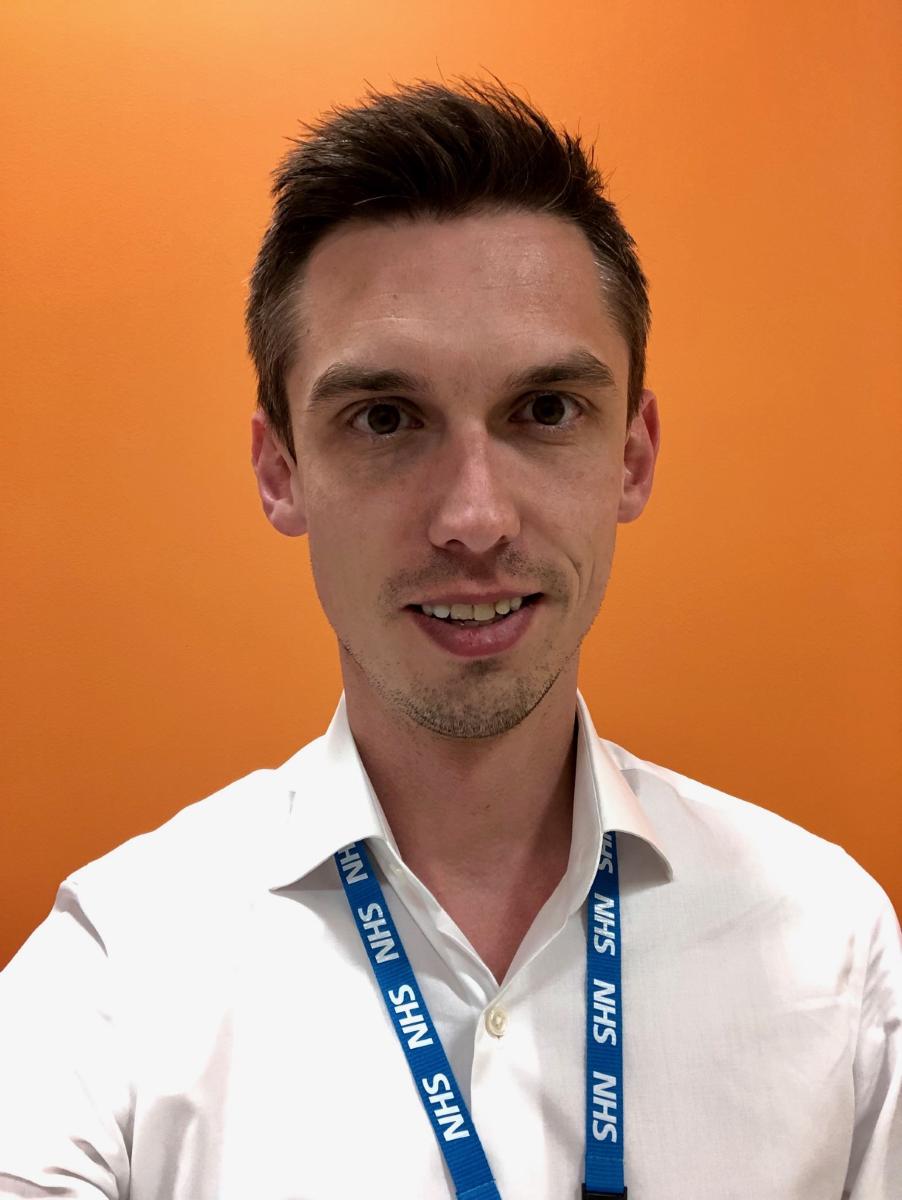60 seconds with... Greg Richardson, Head Orthoptist

Greg Richardson has successfully completed the new Medical Exemptions course for Orthoptists run by the University of Sheffield, making him one of the first twelve Orthoptists in the world to have these rights. In his 60 second interview, Greg tells us about the course and his role at The Royal London Hospital.
What is your role, what does it involve and how long have you worked at Barts Health?
I'm the Deputy Head Orthoptist at The Royal London Hospital, and I've been working at Barts Health for just over 5 years now. Orthoptists are allied health professionals in the eye clinic, who investigate, diagnose and manage disorders of vision and binocular vision (the ability to use our eyes together as a pair) in both children and adults. However a number of orthoptists across the country have extended their roles into other areas of ophthalmology, and one area that I have spent a number of years working in is glaucoma, which causes irreversible loss of vision due to damage to the nerve of sight if it is not diagnosed and treated early.
Could you explain a bit about the course you recently completed?
Orthoptists have never had the ability to use or supply medicines without acting under a patient group direction, which is a document that allows healthcare practitioners to use/supply medicines to a specific group of patients. However in 2016 there were changes to the legislation that allowed orthoptists to undertake further training to enable them to sell, supply and administer certain prescription only medicines within their scope of clinical practice.
The course involved a lot of in depth study into how the medicines work, and how the body reacts to the medicines, as well as understanding indications for use of these medicines. I completed the course in March this year following 6 months of further part time study at The University of Sheffield.
What is the Orthoptic and Optometry department like at The Royal London Hospital?
The Orthoptic and Optometry team are key members of and support the main ophthalmology department. We are a team of six full time orthoptists and eight part time optometrists. We are an incredibly busy service, and a growing team as well. The team is significantly larger than it was five years ago when I started. We are a high performing team who are all involved in clinical work and research. As a relatively small team though, we all get on very well, and the dynamics are excellent with a very stable workforce.
How many patients do you see in a year?
In an average year I myself would see around 3000 patients (children and adults), and our service will see around 31,000 patients. So as you can see, we are very busy!
Why did you choose to specialise in this area?
I have worn glasses since a child, and used to like going to the optician, so it seemed a logical choice! After doing some hospital work experience, including here at The Royal London with one of the consultants I now work with, I decided that I definitely wanted to work in the hospital eye service, and orthoptics gave me the opportunity to ensure that I saw a varied case mix of children and adults.
How has completing the course changed your clinical practice?
Completing the course will enable me to work more efficiently in the glaucoma clinic without need for patient group directions, but will also allow me to use drops to treat bacterial conjunctivitis, and even use drops to treat lazy eye in children. It will hopefully help improve efficacy in our already heavily overbooked clinics!
As one of the first twelve orthoptists in the world to complete the exemptions course, what does this achievement mean to you?
It's great to be one of the first twelve orthoptists in the world to have achieved this. It will allow me to increase my scope of practice in ophthalmology and orthoptics and will also help improve the service we provide here at The Royal London for our patients.
What is your favourite thing about your role?
I love the variety that my job brings. I can spend a morning seeing children with vision problems and squints, then go to theatre to assist with adjustable squint surgery in adults alongside our consultant, before an afternoon of complex neuro-ophthalmology patients who may have double vision or visual field defects. No two days are the same!

 Afrikaans
Afrikaans Albanian
Albanian Amharic
Amharic Arabic
Arabic Armenian
Armenian Azerbaijani
Azerbaijani Basque
Basque Belarusian
Belarusian Bengali
Bengali Bosnian
Bosnian Bulgarian
Bulgarian Catalan
Catalan Cebuano
Cebuano Chichewa
Chichewa Chinese (Simplified)
Chinese (Simplified) Chinese (Traditional)
Chinese (Traditional) Corsican
Corsican Croatian
Croatian Czech
Czech Danish
Danish Dutch
Dutch English
English Esperanto
Esperanto Estonian
Estonian Filipino
Filipino Finnish
Finnish French
French Frisian
Frisian Galician
Galician Georgian
Georgian German
German Greek
Greek Gujarati
Gujarati Haitian Creole
Haitian Creole Hausa
Hausa Hawaiian
Hawaiian Hebrew
Hebrew Hindi
Hindi Hmong
Hmong Hungarian
Hungarian Icelandic
Icelandic Igbo
Igbo Indonesian
Indonesian Irish
Irish Italian
Italian Japanese
Japanese Javanese
Javanese Kannada
Kannada Kazakh
Kazakh Khmer
Khmer Korean
Korean Kurdish (Kurmanji)
Kurdish (Kurmanji) Kyrgyz
Kyrgyz Lao
Lao Latin
Latin Latvian
Latvian Lithuanian
Lithuanian Luxembourgish
Luxembourgish Macedonian
Macedonian Malagasy
Malagasy Malay
Malay Malayalam
Malayalam Maltese
Maltese Maori
Maori Marathi
Marathi Mongolian
Mongolian Myanmar (Burmese)
Myanmar (Burmese) Nepali
Nepali Norwegian
Norwegian Pashto
Pashto Persian
Persian Polish
Polish Portuguese
Portuguese Punjabi
Punjabi Romanian
Romanian Russian
Russian Samoan
Samoan Scottish Gaelic
Scottish Gaelic Serbian
Serbian Sesotho
Sesotho Shona
Shona Sindhi
Sindhi Sinhala
Sinhala Slovak
Slovak Slovenian
Slovenian Somali
Somali Spanish
Spanish Sundanese
Sundanese Swahili
Swahili Swedish
Swedish Tajik
Tajik Tamil
Tamil Telugu
Telugu Thai
Thai Turkish
Turkish Ukrainian
Ukrainian Urdu
Urdu Uzbek
Uzbek Vietnamese
Vietnamese Welsh
Welsh Xhosa
Xhosa Yiddish
Yiddish Yoruba
Yoruba Zulu
Zulu